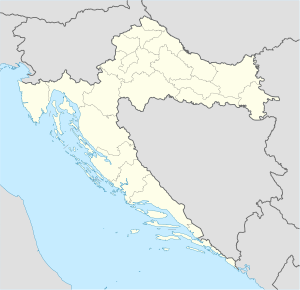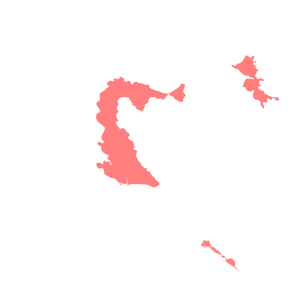Operation Papuk-91
| Operation Swath-10 | |||||||
|---|---|---|---|---|---|---|---|
| Part of the Croatian War of Independence | |||||||
|
Western Slavonian towns on map of Croatia (JNA-held area in late December 1991 is in red) |
|||||||
|
|||||||
| Belligerents | |||||||
|
|
|
||||||
| Commanders and leaders | |||||||
|
|
|
||||||
| Strength | |||||||
| 2,647 troops 48 artillery pieces 12 armoured vehicles |
c. 1,750 troops 22 artillery pieces 8 armoured vehicles |
||||||
| Casualties and losses | |||||||
| 5 killed Dozens wounded |
24 killed | ||||||
| 22 Serb civilians killed, 4,000 displaced | |||||||
Operation Swath-10 (Croatian: Operacija Otkos-10) was a military offensive undertaken by the Croatian Army (Hrvatska vojska, or HV) against the SAO Western Slavonia Territorial Defense Forces on Bilogora Mountain in western Slavonia. Occurring from 31 October to 4 November 1991, during the Croatian War of Independence, the operation was a Croatian victory and its success set the stage for follow-up advances by Croatian forces on Papuk Mountain in Operation Papuk-91 in late November and December. By the end of the year the HV gained control of Papuk, securing transport routes between eastern Slavonia and the rest of Croatia.
The offensives were accompanied by the displacement of most of the Croatian Serb population of the area captured by the HV. The refugees initially fled to Bosnia and Herzegovina, but the majority were soon settled in the Yugoslav People's Army-held Baranja region of eastern Croatia. The offensive provoked accusations that Croatian troops had committed ethnic cleansing and civil-rights abuses; these accusations were disproven by a European Community Monitor Mission (ECMM) report after an ECMM team tour of the area captured by Croatian forces two days after the offensive ended. During Operation Papuk-91 the retreating paramilitary White Eagles perpetrated the Voćin massacre, and its war crimes were prosecuted at the International Criminal Tribunal for the former Yugoslavia.
...
Wikipedia


